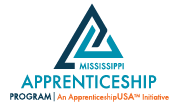Manufacturing companies across the U.S. are turning to automation to streamline and increase production, improve quality, reduce manufacturing times, and create safer work environments. As manufacturing companies change their work modules, the skills needed to fill positions are also evolving. “As a company, we are not a mechanical company anymore,” said Alfred Geiger, CEO of hago Automotive in Iuka, Mississippi. “We are almost like an IT environment where we have to be able to creatively find solutions to problems and then apply a combination of the mechanics, electronics, IT, and robotics to it all.”
While automation is helping manufacturers become more productive, industry leaders say it is increasingly more challenging to recruit the highly skilled workforce needed to install, operate, and maintain robotics production systems. To meet their demand for a highly-skilled workforce, hago partnered with the Mississippi Apprenticeship Program and Northeast Mississippi Community College (NEMCC) to launch a youth apprenticeship program.
The program is designed for high school students and young adults ages 16 to 23, according to Cheri Hemlinger, executive assistant at hago and program administrator for the youth apprenticeship program. According to Hemlinger, young people spend the first two to three months of the program shadowing an employee in one of three areas, including industrial maintenance, tool and die, or quality engineering. After the shadowing portion of the program is complete, students enroll in courses at NEMCC to continue their four-year apprenticeship training. Students’ curriculum is split in two days at college and another three days working alongside skilled employees at hago where they receive the support of a mentor and other department trainers. “Department trainers work specifically with students and NEMCC to tailor their learning to ensure they get on-the-job training that supports what they learn in the classroom,” said Hemlinger.
The company’s financial commitment, in combination with funding from a variety of local, state, and federal sources, allows students to attend NEMCC at no cost. The students also earn wages while working for hago and learning first-hand what it takes to be successful in a job with the company. After completing the program, they will graduate with a registered apprenticeship and a minimum of an associate degree. “Simple manufacturing jobs are going away and being replaced with jobs that require a higher qualification that cannot be taught at universities,” said Geiger. “You have to have hands-on training that brings mechanical and college knowledge together.”
The four-year program launched in May 2019 with three apprentices. The company plans to add three more apprentices each year. Even though the program is new for the Iuka plant, Geiger says Germany-based hago has over 40 years of experience managing a successful apprenticeship program. The company has more than 75 apprentices enrolled in the program in Germany.
In addition to helping to close the skills gap at the plant in Iuka, Geiger says youth apprenticeship programs have other benefits. “We can train youth to the precise needs of our company and develop them to become the highly qualified employees we need for years to come.”
Geiger says the apprenticeship program is a win-win for businesses and apprentices, especially youth looking for a stable career path. “It’s important for everyone to look into the apprenticeship program as a real alternative to college. If I look at what we pay our top maintenance and tool and die technicians, an apprenticeship can really open the way for a young person, who might not be interested in college, to have a successful alternative career path and make a very good living.”



